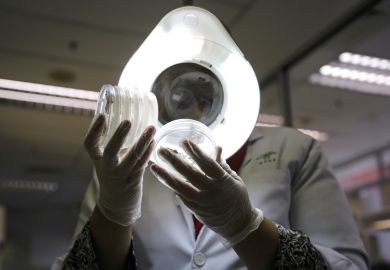The involvement of 10 universities that have officially joined a UK network set up to tackle the issue of reproducibility in research will be “critical” in making an impact, one of its leaders has said.
Institutions including UCL and the universities of Edinburgh, Bristol and Sheffield have signed up to be part of the UK Reproducibility Network, which was established last year in a bid to better coordinate efforts to boost the robustness of research.
Each university has created a role that will feature a senior academic leading on practical steps the institution is taking to bolster research quality, such as better training, open data practices and assessing the criteria used in recruitment and promotion decisions.
Marcus Munafò, chair of the network and professor of biological psychology at the University of Bristol, told Times Higher Education that the official involvement of universities provided a vital “middle” layer between funders and academics in the drive to tackle the issue.
A number of research councils, journal publishers and sector organisations were already involved with the project, and Professor Munafò said that early and mid-career researchers were very engaged with its aims because they were at the sharp end of current scientific practice.
He added that universities were the “middle part of that structure. That is critical because much of the culture within academia is embodied within institutions through things like their hiring and promotion criteria, for example.”
“To a large extent, it is about creating incentives at multiple levels that make it more likely that what we do [as researchers] aligns with the right thing to do,” he said.
Having institutions on board would also allow them to develop a consistent approach towards policies that can shift research culture away from practices that hamper reproducibility and transparency, Professor Munafò said.
Writing about the development in Nature, he says “changes to incentives at a single institution will not make new behaviours stick, not least because practices required in only one place can act as a career tax on its scientists. Only if changes occur across many institutions will the impacts permeate scientific culture.”
Emily Farran, professor of developmental psychology at the University of Surrey, has taken on the role of academic lead for research culture and integrity at her institution, another one of the 10 joining the UKRN. Being a member of the network would help Surrey to “harmonise” its open research policy with other universities so that “we are not all just reinventing the wheel at our own institutions”, she said.
A major part of her initial work will be to survey researchers to identify gaps in knowledge and current practices, she added.
Gary Macfarlane, clinical chair in epidemiology at another UKRN member, the University of Aberdeen, said that among his institution’s plans was a student focus, with an MSc module in “open and reproducible data science” being introduced next year.
He predicted that university involvement in the UKRN would grow quickly. “I really think come two or three years’ time almost every university will be signed up because people will realise that this is very important,” he said.
Register to continue
Why register?
- Registration is free and only takes a moment
- Once registered, you can read 3 articles a month
- Sign up for our newsletter
Subscribe
Or subscribe for unlimited access to:
- Unlimited access to news, views, insights & reviews
- Digital editions
- Digital access to THE’s university and college rankings analysis
Already registered or a current subscriber?











